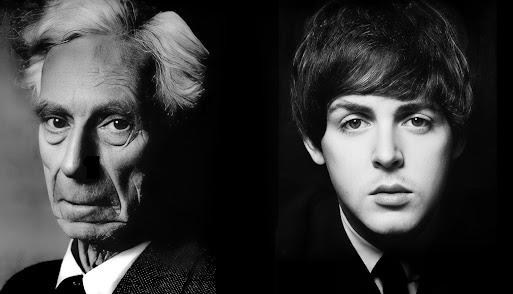Paul McCartney comments how Bertrand Russell influenced The Beatles and the 60's Anti-Vietnam War movement
“I had the luck to meet a guy called Bertrand Russell. The famous philosopher. And he was just living in London. And somebody said he was living on that street. So I went, you know, "knock, knock", so you know, I came in, so I talked to him, and he was very gracious. We talked a lot and he actually pointed out to me that there was this horrible war going on called Vietnam. So I went to the studio that evening and said to the guys "Hey, you know, I meet Bertrand and he's really against this war". And so I sort of explained the issue. But now after that John took that up, and really became the activist with Yoko and they did that bed in and stuff, which was great and brought people's attention to it. And I often say people say to me "Do you think music can change the world?" I say did you ever see that video of people chanting "Give Peace a Chance to the Nixon White House?“
— Paul McCartney, 14 January 2009 interview on The View
━━
Background: Bertrand Russell, The Beatles and the 60's Anti-War movement.
Bertrand Russell was an unusual British phenomena. An intellectual who made pronouncements about contemporary life and current affairs to whom ordinary people listened with respect (much to the distress of the UK and US governments). Russell was a passionate rationalist who was outraged by what he considered humankind's irrational beliefs and needless cruelties. In the popular imagination Bertrand Russell was 'that old man with an enormous math brain' who therefore had the right to speak out and be heard. Towards the end of his life, Russell became an iconic figure for young people in the 1960's. They read his populist philosophy books, especially A History of Western Philosophy (1945), listened to his broadcasts on the radio and looked forward to his appearances on television. Russell helped set the tone for future anti-war protests of the late 60's and early 70's and he encouraged young people to challenge entrenched political, religious and social ideologies and dogmas.
Paul McCartney, a member of rock band The Beatles, said that after he met with Russell at his home and discussed the horrors of the Vietnam War, it was then McCartney inspired John Lennon and the band to take an anti-war stance. Russell had very little respect for authority and encouraged the public to share his distrust of conventional politics and politicians. In October 1965 Russell publicly tore up his Labour Party card on account Harold Wilson's Labour government promised to send troops to support the United States in Vietnam, a promise he later withdrew.
Russell said in a Studs Terkel Radio Interview (1962):
“Look at me, I'm 90! Young people have their life ahead of them, they want to be allowed to live it, and they don't want these elderly ruffians to come and say, "No, we will wipe you out in a nuclear war, just please vote for us so that we may win the next election." Of course, they don't want that, and I think that's very natural in the young and very praiseworthy.“

